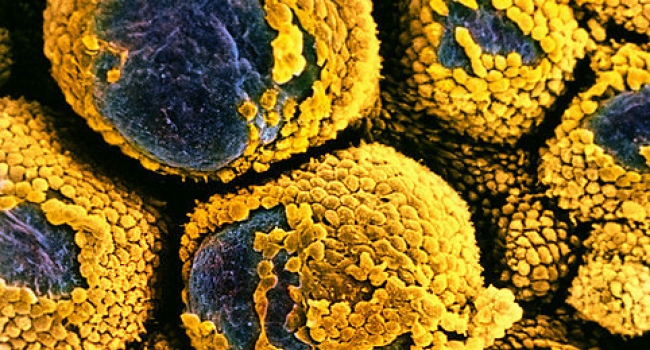- Latest news▼
-
19:41, April 25 Children’s Hospital Los Angeles and International Center of Professional Development Allergy/Immunology Conference

-
17:31, April 25 JAMA: patient grew long, curly eyelashes because of chemotherapy

-
11:08, April 25 Mpox epidemic declared in Republic of the Congo

-
08:31, April 25 OU: quitting smoking 4 times more likely to cure laryngeal cancer

-
01:20, April 25 Paralyzed man in China writes hieroglyphs using neural implants placed in his brain

-
15:11, April 24 Zombie deer disease possibly linked to hunters’ deaths

-
12:27, April 23 Appetite: Scientists found out the secret to the appeal of large portions of fast food

-
10:33, April 23 Scientists test new approach to fighting viruses

-
08:38, April 23 Ketamine may help with postpartum depression

-
22:12, April 22 Unhealthy amount of sugar found in baby food products of a well-known brand

-
19:41, April 22 Air pollution puts health of more than 1.6 billion workers globally at risk

-
17:25, April 22 Scientists found baked goods and lack of sleep to be more dangerous than alcohol

-
16:02, April 22 342 cases of measles recorded in Armenia so far in 2024

-
15:29, April 22 BrainStimulation: electrical brain stimulation alleviates anxiety and depression in the elderly

-
08:27, April 22 Cognitively stimulating jobs in midlife could lower dementia risk in old age, study finds

All materials
A glass of red wine a day could keep polycystic ovaries at bay

It's already been linked to preventing cancer, protecting against heart problems and improving brain function.
Now scientists say a glass of red wine a day could prevent women from developing a common condition that can stop them having children.
The latest research suggests a natural compound found in red wine, called resveratrol, may help to address the hormone imbalance in women with polycystic ovary syndrome (PCOS).
PCOS is a leading cause of female infertility, thought to affect around one in 10 women worldwide.
It is the most common endocrine condition in women of childbearing age and is found in those who produce higher amounts of testosterone and androgen than average.
The exact cause of PCOS is unknown, but it often runs in families.
The elevated levels contribute to irregular or absent menstrual periods as well as weight gain, infertility and excess hair as well as increasing the risk of developing other health problems such as diabetes.
Nut scientists believe the natural plant compound, also found in nuts and grapes, has anti-inflammatory properties which reduce a woman's chances of developing it.
Study senior author Dr Antoni Duleba, of the University of California, said: 'Our study is the first clinical trial to find resveratrol significantly lowers PCOS patients' levels of testosterone as well as dehydroepiandrosterone sulfate (DHEAS), another hormone that the body can convert into testosterone.
'This nutritional supplement can help moderate the hormone imbalance that is one of the central features of PCOS.'
In the study, 30 women with polycystic ovaries completed a randomised trial at the University of Poznan in Poland where they were either given a resveratrol supplement or a placebo pill.
The participants, who took the pills daily for three months, gave blood samples at the beginning and end of the study to determine the level of testosterone and androgen.
They were also given an oral glucose tolerance test to measure the risk of diabetes.
Women who took the resveratrol supplement saw testosterone levels fall by 23.1 and DHEAS by 22.2 per cent while the placebo group's testosterone levels increased 2.9 per cent and DHEAS increased by 10.5 per cent.
The participants taking the supplement pill also saw a reduction in the risk of diabetes as fasting insulin levels dropped by 31.8 per cent and they became more responsive to the insulin hormone.
Dr Duleba said: 'The findings suggest resveratrol can improve the body's ability to use insulin and potentially lower the risk of developing diabetes.
'The supplement may be able to help reduce the risk of metabolic problems common in women with PCOS.'
The findings were published in the Endocrine Society's Journal of Clinical Endocrinology & Metabolism.
Follow NEWS.am Medicine on Facebook and Twitter
- Video
- Event calendar
- Children’s Hospital Los Angeles and International Center of Professional Development Allergy/Immunology Conference
- First Armenian-German Conference entitled “Heart Failure Spring School”
- Allogeneic bone marrow transplant in case of hematological malignancy performed in Armenia for first time
All materials
- Archive
- Most read
month
week
day
- Scientists found baked goods and lack of sleep to be more dangerous than alcohol 982
- Next pandemic likely to be triggered by flu - scientists 977
- 342 cases of measles recorded in Armenia so far in 2024 935
- Scientists develop new method to safely stimulate immune cells to fight cancer 796
- Cognitively stimulating jobs in midlife could lower dementia risk in old age, study finds 793
- Blood test can determine who is at risk of developing multiple sclerosis - scientists 788
- BrainStimulation: electrical brain stimulation alleviates anxiety and depression in the elderly 729
- Unhealthy amount of sugar found in baby food products of a well-known brand 714
- Ketamine may help with postpartum depression 713
- Appetite: Scientists found out the secret to the appeal of large portions of fast food 705
- Air pollution puts health of more than 1.6 billion workers globally at risk 704
- Scientists test new approach to fighting viruses 690
- Zombie deer disease possibly linked to hunters’ deaths 613
- Mpox epidemic declared in Republic of the Congo 409
- Paralyzed man in China writes hieroglyphs using neural implants placed in his brain 368
- Find us on Facebook
- Poll





